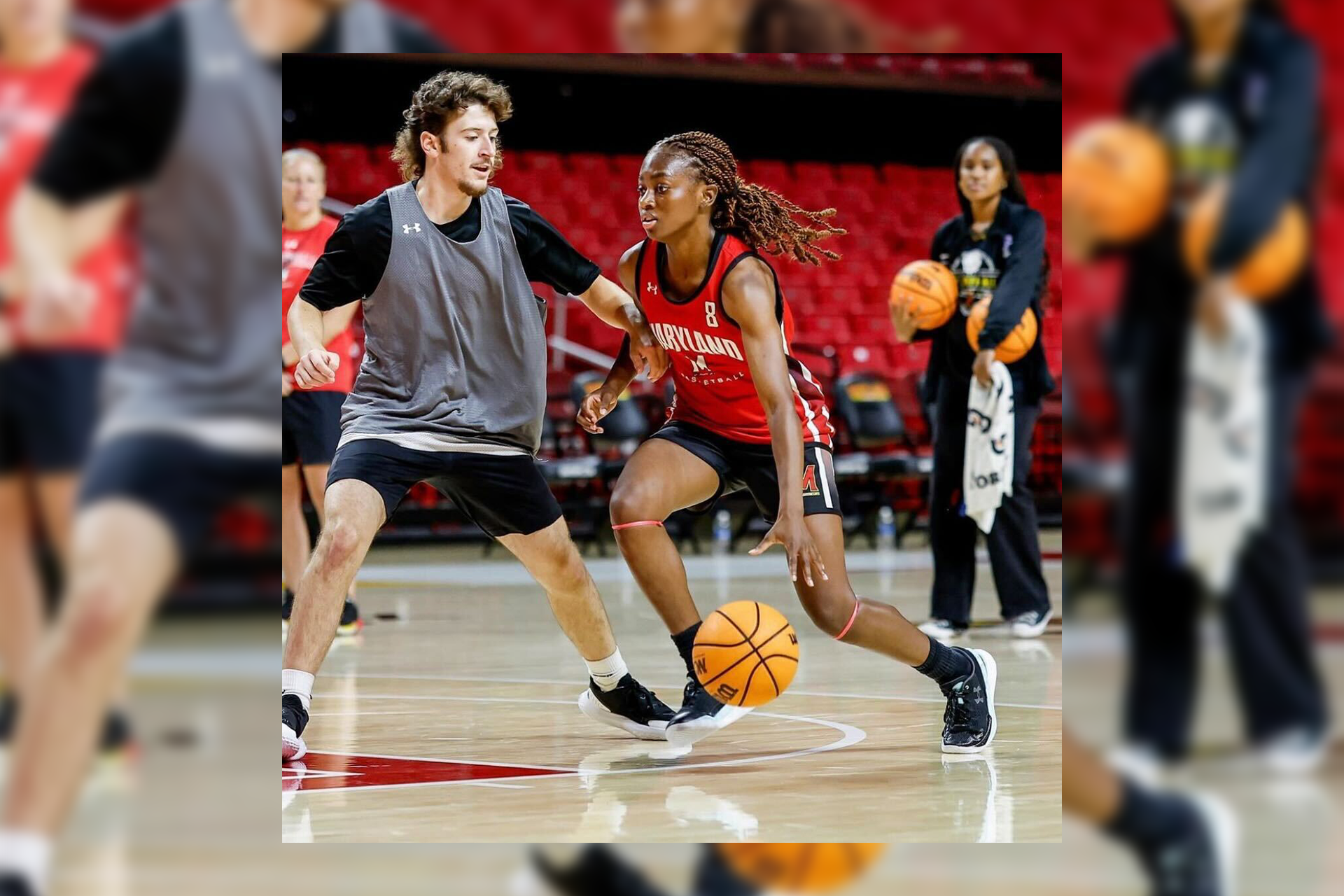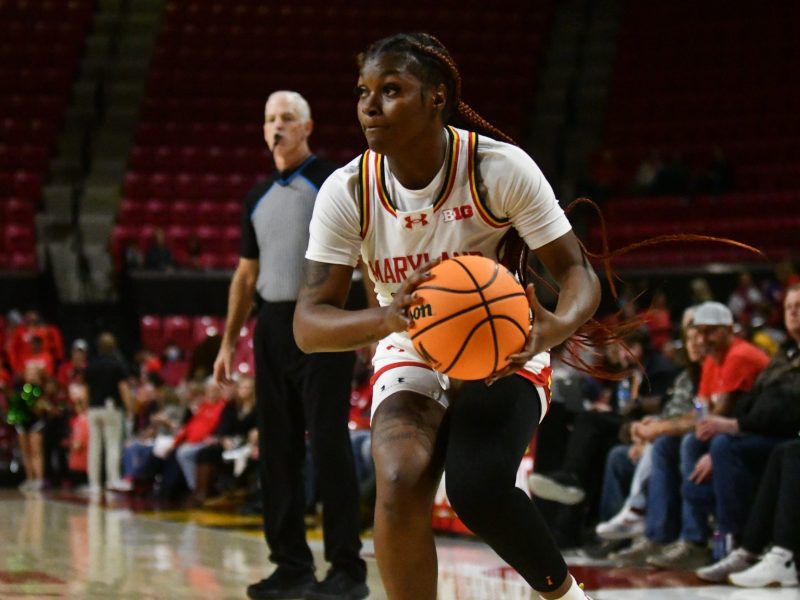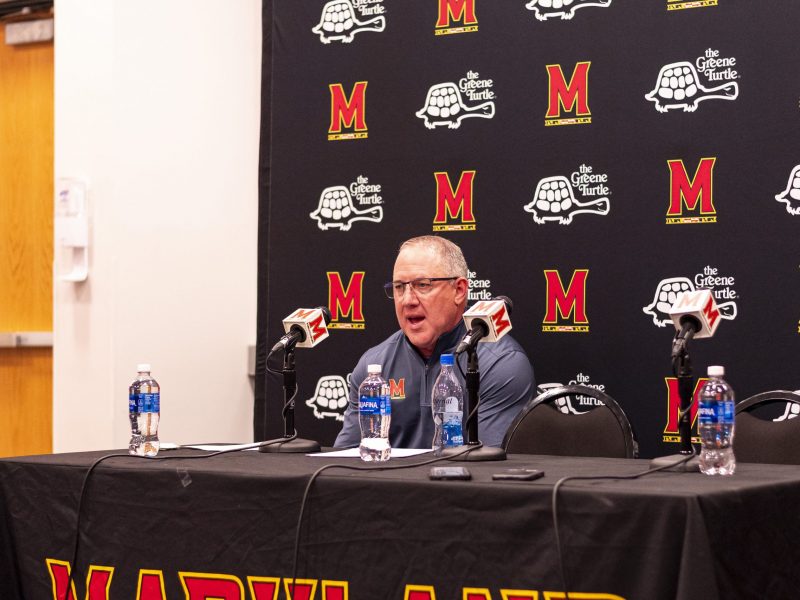Sam Benning walked onto an empty Xfinity Center court out of the dimly lit tunnel. With about 20 minutes left before Maryland women’s basketball took the floor for its team practice, assistant coach Kaitlynn Fratz pulled him aside.
“Hey, you’re 24 today, Richardson,” the junior operations management and business major recalled Fratz saying.
Benning, a member of Maryland’s scout team — an all-male group of players that practice against the Terps — was ecstatic. He had been assigned to emulate Reigan Richardson, one of Duke’s primary scorers.
Benning watched film of Richardson the night before. He’s a fan of her playing style, which features mid-range jumpers with an offensive-heavy mindset.
Fratz’s assignment was intentional. Fratz, the leader of Maryland’s scout team, designates each scout-teamer with a specific player on an opponent’s team, making player comparisons based on shared skills and tendencies.
The scout-teamers’ job is to imitate play styles.
“I think that’s the luxury of having 28 [players] — you can sort of hand pick based off personnel,” Fratz said.
Benning spent years playing basketball for Scituate High School and the AAU team Middlesex Magic while growing up in Scituate, Massachusetts, but entered Maryland without the chance to play competitively as often.
[Maryland women’s basketball’s 3-point barrage displayed another element of its offense]
His lone opportunities to play collegiately came from freshman pickup runs at Eppley Recreation Center. One day, he matched against someone sporting a Maryland flag design on team-branded shoes.
His competitor told Benning he got his footwear from the scout team.
With the chance to continue playing competitive basketball and snag free Maryland gear, Benning knew he wanted to join. His Eppley opponent shortly put him in touch with the Terps’ coaching staff, who welcomed Benning “with open arms,” he said.
Recommendations from current scout team players make up most of future talent, Fratz said. Occasionally, people who don’t have connections email her.
“I think the best ones I’ve ever gotten was when they attach their YouTube highlights of their high school and AAU days, solidifying that they can play. And I actually watch them,” Fratz said. “It tells me they’re bought in.”
Benning and most other scout-teamers have been part of the group for years. They’ve developed chemistry, absorbing and learning Maryland’s plays, sets and tendencies.
Still, there’s usually a learning curve.
When Benning guarded All-Big Ten first team guard Shyanne Sellers in his first practice, she accelerated to the paint, backing him down before taking two dribbles and a pump fake, which he fell for. Sellers let him fly by, then rose for a layup as Benning watched from the air in disbelief — his “‘welcome to the league’ moment,” he recalled.
The scout-teamers bring competitiveness that serve as an integral piece to game-planning success, Sellers said. She feels the members push the Terps hard during practice so they’re comfortable during games.
“We talk a lot, we talk back and forth,” Sellers said. “Just competitive spirit the whole time and it’s all love.”
[Maryland women’s basketball signs 2 players in 2025 class]
Coach Brenda Frese wants physical and aggressive play from the scout team to properly prepare Maryland for game action. Pushing the scout team in practice helps simulate that.
“If scout isn’t doing what they need, coach Frese is able to get on them just as hard as she gets on the team,” Fratz said. “I love that they’re held to just as high of a standard, but they [also] hold themselves to that high standard.”
The group holds themselves accountable, something Fratz doesn’t take for granted.
Fratz remembers one practice where Frese criticized the scout team for not playing hard enough. Hours later, texts flooded through the “Maryland Scout Team” group chat. Fratz screenshotted the text and showed it to the rest of Maryland’s coaching staff.
“Guys, we need to be better,” Fratz recalled one message reading. “It’s unacceptable for coach Frese to be able to get on us in practice. We have to show up better.”
Fratz took over as the Terps’ scouting and player development director ahead of the 2018 season. Just a few seasons into her role, COVID-19 pandemic protocols let only three scout-teamers attend practice each day. All three members graduated, which meant Fratz had to start from scratch to rebuild the program when students returned to campus.
With a lack of player interest coming to her, Fratz searched for talent herself. The coaching staff watched students play in pick-up games at Eppley in hopes of finding guys to add to the team.
Fratz often stressed over whether she’d even have five people show up to practice.
She doesn’t worry anymore. There’s an abundance of scout-teamers available every day, with six to seven chosen to help at each practice. Fratz considers it a luxury.
“I have nothing but amazing things to say about them,” Fratz said. “They’re life changing.”



